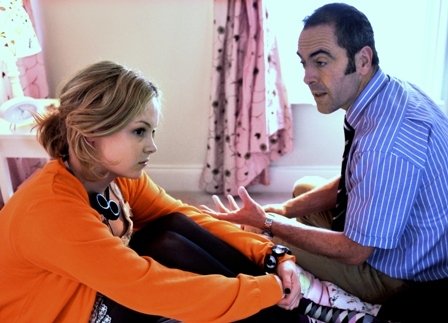Cherrybomb (2009) 
“Two guys.One girl.Game on.”

Director: Lisa Barros D’Sa, Glenn Leyburn
Cast: Rupert Grint, Robert Sheehan, James Nesbitt
Synopsis: Three teenagers go on a wild weekend of drink, drugs, shop-lifting and stealing cars that quickly spins beyond their control.
It’s refreshing, even for those who haven’t fallen under the spell of Harry and his Hogwart mates, to see Rupert Grint taking centre stage in a role that is so far removed from that of Ron Weasley – and it’s perhaps not entirely coincidental that in Cherrybomb he plays a youth who spends a good deal of his time attempting to establish his own identity as something other than just the sidekick of his impossibly cool – and irretrievably damaged – best friend, played with a fragile exuberance by Irish actor Robert Sheehan. Sadly, while the performances from the young cast – including Kimberley Nixon as a troubled object of lust for both boys – are first rate, the plot fails to really provide any insight into what it means to be a teenager growing up in present-day Northern Ireland, opting instead for a sour tone and a downbeat ending.
Grint plays 16-year-old Malachy, a bright lad working through the summer at the Titanic Leisureplex while awaiting his exam results, and messing around with his best mate Luke (Sheehan) when he isn‘t collecting tennis balls or spying on the leisure complex boss (James Nesbitt) exploring staff relationships with 16-year-old Donna a little too intimately on his office desk. Into the boy’s lives strolls the alluring Michelle (Nixon), the daughter of Malachy’s boss, and it’s not long before she’s playing the two friends off one another as they vie for her affections. While Luke’s bad boy persona gives him an edge over Malachy, an alcoholic father and bullying, drug dealer brother are taking a toll on his emotional health, and his efforts to woo Michelle are fuelled as much by his fear of losing Malachy, the only person in his life who really cares about him, as by his lust for her. Similarly, Malachy single-minded determination to bed Michelle is inspired by his desire to prove he is more than just Luke’s slightly dull sidekick.
Grint gives an affecting performance as Malachy, a typical boy on the cusp of manhood, driven by impulses he barely understands, and there’s a touching sadness in his eyes, put there partly by the ubiquitous teen conviction of being a different person to the one perceived by a family with whom he seems to have nothing in common, but mostly down to a life of being overshadowed by his more colourful friend. Sheehan does well to capture that facade of confidence that only barely conceals feelings of inadequacy and helplessness as he begins to realise how little control he really has over a life that already seems to be have been mapped out for him. Nothing that happens in the movie gives us any reason to believe the fate awaiting him isn’t a bleak one, and there’s something unsettling in the way his father (superbly played by Lalor Roddy) looks like a dissipated version of Luke, thirty years on. While the two boy’s characters are coloured with a measure of depth, that of Michelle gives Kimberley Nixon little to work with. The victim of her parent’s bitter divorce, she tiresomely switches her affection from one boy to another for no apparent reason, a vacillation that ultimately undermines the believability of her character.
Cherrybomb’s teens may be typical of today’s 16-year-olds, but in that respect it serves up a dispiriting dish. The kids all appear jaded, cynical, already weary of life’s fickleness. They all look older than they should, and their idea of fun is to get wasted on booze and drugs and deface public amenities. It’s a stereotypical image to some degree, and writer Daragh Carville offers up no counterpoint to this teen nihilism and leaves us with a demoralising conclusion that provides little reason for hope.
httpv://www.youtube.com/watch?v=zBZ8mTtoI9I
